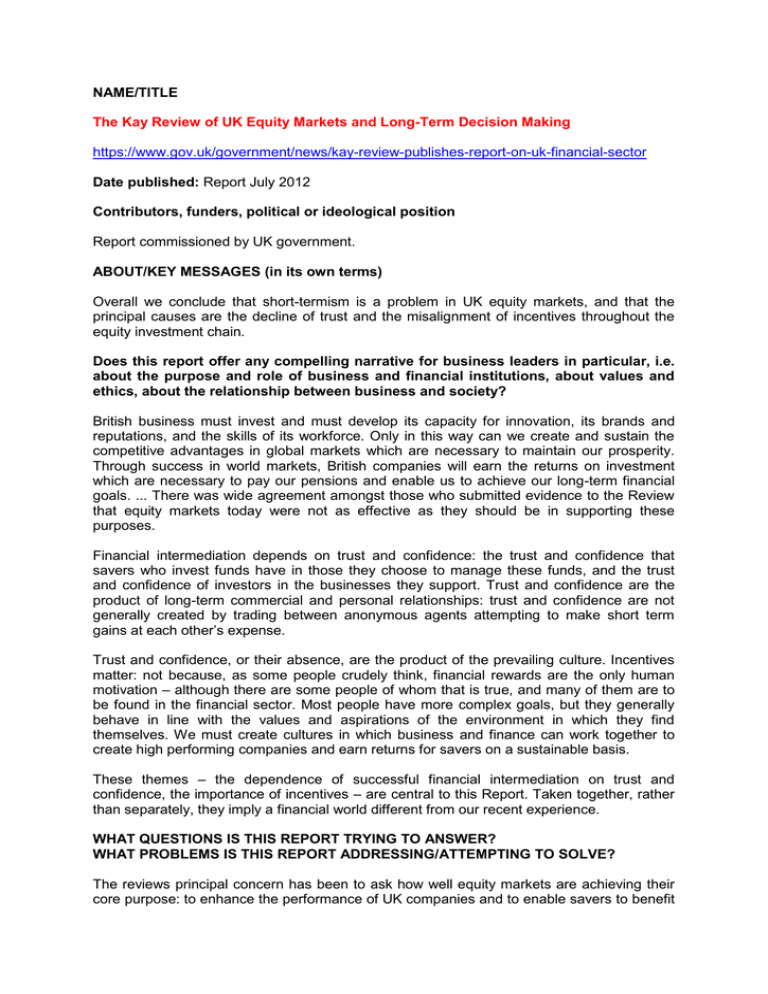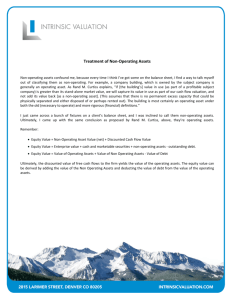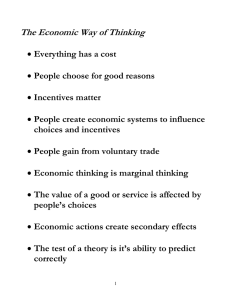NAME/TITLE Date published: Contributors, funders, political or ideological position
advertisement

NAME/TITLE The Kay Review of UK Equity Markets and Long-Term Decision Making https://www.gov.uk/government/news/kay-review-publishes-report-on-uk-financial-sector Date published: Report July 2012 Contributors, funders, political or ideological position Report commissioned by UK government. ABOUT/KEY MESSAGES (in its own terms) Overall we conclude that short-termism is a problem in UK equity markets, and that the principal causes are the decline of trust and the misalignment of incentives throughout the equity investment chain. Does this report offer any compelling narrative for business leaders in particular, i.e. about the purpose and role of business and financial institutions, about values and ethics, about the relationship between business and society? British business must invest and must develop its capacity for innovation, its brands and reputations, and the skills of its workforce. Only in this way can we create and sustain the competitive advantages in global markets which are necessary to maintain our prosperity. Through success in world markets, British companies will earn the returns on investment which are necessary to pay our pensions and enable us to achieve our long-term financial goals. ... There was wide agreement amongst those who submitted evidence to the Review that equity markets today were not as effective as they should be in supporting these purposes. Financial intermediation depends on trust and confidence: the trust and confidence that savers who invest funds have in those they choose to manage these funds, and the trust and confidence of investors in the businesses they support. Trust and confidence are the product of long-term commercial and personal relationships: trust and confidence are not generally created by trading between anonymous agents attempting to make short term gains at each other’s expense. Trust and confidence, or their absence, are the product of the prevailing culture. Incentives matter: not because, as some people crudely think, financial rewards are the only human motivation – although there are some people of whom that is true, and many of them are to be found in the financial sector. Most people have more complex goals, but they generally behave in line with the values and aspirations of the environment in which they find themselves. We must create cultures in which business and finance can work together to create high performing companies and earn returns for savers on a sustainable basis. These themes – the dependence of successful financial intermediation on trust and confidence, the importance of incentives – are central to this Report. Taken together, rather than separately, they imply a financial world different from our recent experience. WHAT QUESTIONS IS THIS REPORT TRYING TO ANSWER? WHAT PROBLEMS IS THIS REPORT ADDRESSING/ATTEMPTING TO SOLVE? The reviews principal concern has been to ask how well equity markets are achieving their core purpose: to enhance the performance of UK companies and to enable savers to benefit from the activity of these businesses through returns to direct and indirect ownership of shares in UK companies. The terms of reference for the review were: To examine the mechanisms of corporate control and accountability provided by UK equity markets and their impact on the long term competitive performance of UK businesses, and to make recommendations. This will include the following areas: Whether the timescales considered by boards and senior management in evaluating corporate risks and opportunities, and by institutional shareholders and fund managers in making investment and governance decisions, match the time horizons of the underlying beneficiaries. ... Whether the current functioning of equity markets gives sufficient encouragement to boards to focus on the long term development of their business. ... HOW DOES THIS REPORT IMAGINE CAPITALISM WILL BE DIFFERENT IN THE FUTURE? Our proposals aim to: Restore relationships of trust and confidence in the investment chain, underpinned by the application of fiduciary standards of care by all those who manage or advise on the investments of others Emphasise the central function of trust relationships in financial intermediation and diminish the current role of trading and transactional cultures Establish high level Statements of Good Practice for key players in the investment chain – Asset Holders, Asset Managers and Company Directors Address the disincentives to engagement by asset managers with investee companies that arise from fragmented shareholding and the perceived regulatory barriers that inhibit collective engagement, by establishing an investors’ forum for institutional investors in UK companies Improve the quality of engagement by investors with companies, emphasising and broadening the existing concept of stewardship Increase incentives to such engagement by encouraging asset managers to hold more concentrated portfolios judged on the basis of long-term absolute performance Shift regulatory philosophy and practice towards support for market structures which create appropriate incentives, rather than seeking to counter inappropriate incentives through the elaboration of detailed rules of conduct Tackle misaligned incentives in the remuneration practices of company executives and asset managers, the disclosure of investment costs, and in stock lending practices Reduce the pressures for short-term decision making that arise from excessively frequent reporting of financial and investment performance (including quarterly reporting by companies), and from excessive reliance on particular metrics and models for measuring performance, assessing risk and valuing assets. WHAT RECOMMENDATIONS DOES THIS REPORT MAKE FOR THE VARIOUS ACTORS The report offers 10 principles for all participants in the investment chain and makes 17 detailed recommendations for government, regulators, companies, investors and asset managers. Principles 1. All participants in the equity investment chain should act according to the principles of stewardship, based on respect for those whose funds are invested or managed, and trust in those by whom the funds are invested or managed. 2. Relationships based on trust and respect are everywhere more effective than trading transactions between anonymous agents in promoting high performance of companies and securing good returns to savers taken as a whole. 3. Asset managers can contribute more to the performance of British business (and in consequence to overall returns to their savers) through greater involvement with the companies in which they invest. 4. Directors are stewards of the assets and operations of their business. The duties of company directors are to the company, not its share price, and companies should aim to develop relationships with investors, rather than with ‘the market’. 5. All participants in the equity investment chain should observe fiduciary standards in their relationships with their clients and customers. Fiduciary standards require that the client’s interests are put first, that conflict of interest should be avoided, and that the direct and indirect costs of services provided should be reasonable and disclosed. These standards should not require, nor even permit, the agent to depart from generally prevailing standards of decent behaviour. Contractual terms should not claim to override these standards. 6. At each stage of the equity investment chain, reporting of performance should be clear, relevant, timely, related closely to the needs of users and directed to the creation of longterm value in the companies in which savers’ funds are invested. 7. Metrics and models used in the equity investment chain should give information directly relevant to the creation of long-term value in companies and good risk adjusted long-term returns to savers. 8. Risk in the equity investment chain is the failure of companies to meet the reasonable expectations of their stakeholders or the failure of investments to meet the reasonable expectations of savers. Risk is not short-term volatility of return, or tracking error relative to an index benchmark, and the use of measures and models which rely on such metrics should be discouraged. 9. Market incentives should enable and encourage companies, savers and intermediaries to adopt investment approaches which achieve long-term returns by supporting and challenging corporate decisions in pursuit of long-term value. 10. The regulatory framework should enable and encourage companies, savers and intermediaries to adopt such investment approaches. Recommendations 1. The Stewardship Code should be developed to incorporate a more expansive form of stewardship, focussing on strategic issues as well as questions of corporate governance. 2. Company directors, asset managers and asset holders should adopt Good Practice Statements that promote stewardship and long-term decision making. Regulators and industry groups should takes steps to align existing standards, guidance and codes of practice with the Review's Good Practice Statements. 3. An investors’ forum should be established to facilitate collective engagement by investors in UK companies. 4. The scale and effectiveness of merger activity of and by UK companies should be kept under careful review by BIS and by companies themselves. 5. Companies should consult their major long-term investors over major board appointments. 6. Companies should seek to disengage from the process of managing short term earnings expectations and announcements. 7. Regulatory authorities at EU and domestic level should apply fiduciary standards to all relationships in the investment chain which involve discretion over the investments of others, or advice on investment decisions. These obligations should be independent of the classification of the client, and should not be capable of being contractually overridden. 8. Asset managers should make full disclosure of all costs, including actual or estimated transaction costs, and performance fees charged to the fund. 9. The Law Commission should be asked to review the legal concept of fiduciary duty as applied to investment to address uncertainties and misunderstandings on the part of trustees and their advisers. 10. All income from stock lending should be disclosed and rebated to investors. 11. Mandatory IMS (quarterly reporting) obligations should be removed. 12. High quality, succinct narrative reporting should be strongly encouraged. 13. The Government and relevant regulators should commission an independent review of metrics and models employed in the investment chain to highlight their uses and limitations. 14. Regulators should avoid the implicit or explicit prescription of a specific model in valuation or risk assessment and instead encourage the exercise of informed judgment. 15. Companies should structure directors’ remuneration to relate incentives to sustainable long-term business performance. Long-term performance incentives should be provided only in the form of company shares to be held at least until after the executive has retired from the business. 16. Asset management firms should similarly structure managers’ remuneration so as to align the interests of asset managers with the interests and timescales of their clients. Pay should therefore not be related to short-term performance of the investment fund or asset management firm. Rather a long-term performance incentive should be provided in the form of an interest in the fund (either directly or via the firm) to be held at least until the manager is no longer responsible for that fund. 17. The Government should explore the most cost effective means for individual investors to hold shares directly on an electronic register. Does this report have anything to say about major medium to long term economic and social issues Supplies of the essentials of life: Food, Water, Housing, Energy and Transport Climate change, resource depletion, loss of biodiversity Population growth and demographic change Economic growth, innovation, employment, the distribution of income and wealth The governance of business and the financial system; public trust The respective roles of government and business The respective values of economic, social and environmental capital The report is mainly concerned with the governance of business and the financial system and the issue of public trust.





